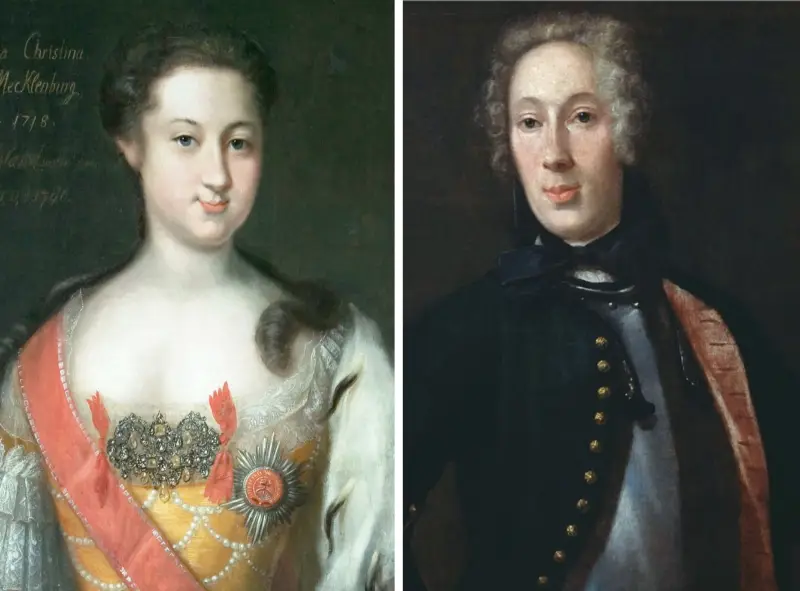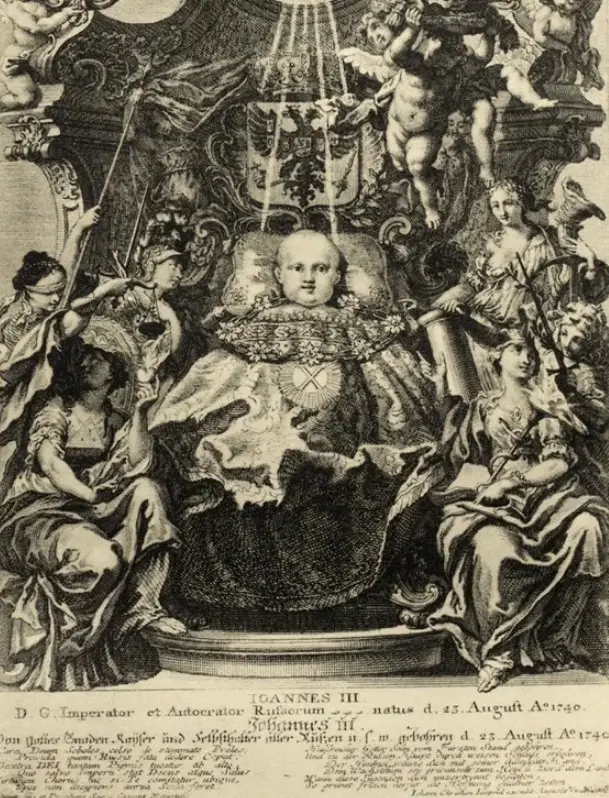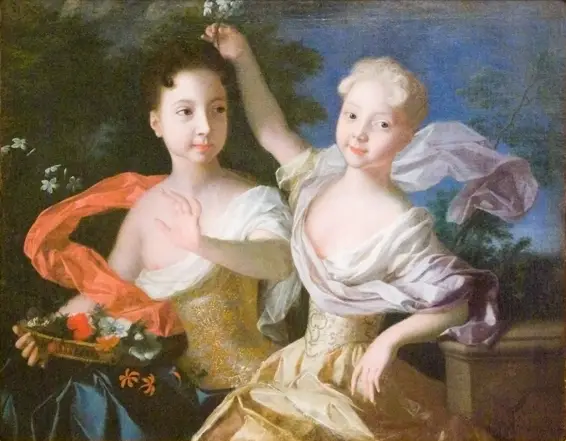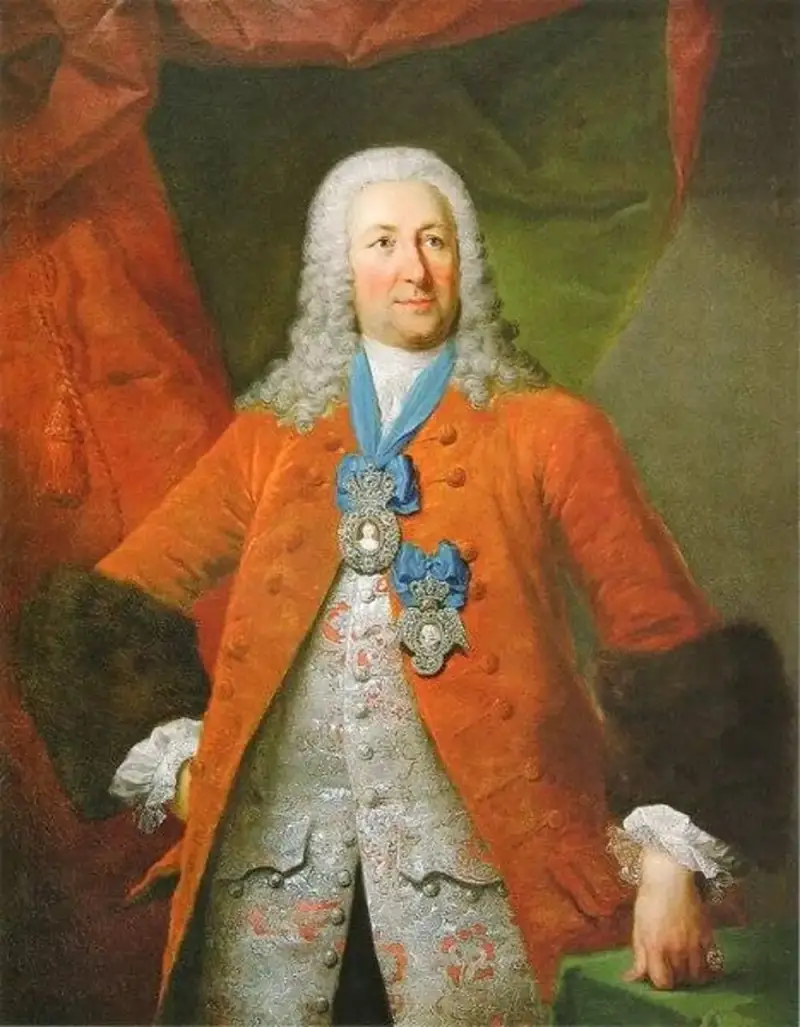Cavalier Chetardie, “particular friend” of Elizaveta Petrovna

One of the most famous French diplomats in our country is Jacques-Joachim Trotti, Marquis de la Chetardie, whose life spanned the first half of the 18th century. This is due to his activities in St. Petersburg, where he played a large role in preparing the coup d’etat, after which power in the country was seized by the daughter of Peter I, Elizabeth.
Valentin Pikul wrote about Shetardy; he became the hero of several films and TV series. This, for example, is how viewers of the famous film “Midshipmen, Forward” (1987) saw him - a typical Frenchman, according to director S. Druzhinina:

She probably would have been happy to invite Boyarsky to play the role of Shetardy, but he was already involved in this film.
This is how the Marquis Chétardy appears before us in the TV series “Catherine” (2014), starring Patrick Roullier Rollin:

And here's what he really looked like:

At the same time, Chétardie can by no means be called a successful diplomat - he is, rather, a failure: his allies the Swedes lost the war, and he failed the main mission to destroy the alliance between Russia and Austria concluded in 1726.
We will talk about Shetardy in this article.
Marquis Chetardie before arriving in St. Petersburg
Jacques-Joachim Trotti de la Chetardie's father was an aristocrat from a "good family" of Italian origin. About the mother of the future diplomat, a representative of the ancient but already impoverished Languedoc family of Montale-Villebreuil, Saint-Simon wrote:
The hero of the article was born on January 3, 1705. His father died before his birth, and his mother soon entered into a second marriage. Her chosen one was the Bavarian nobleman Monasterol, who quickly squandered his fortune and then shot himself, leaving the family with a lot of debt. The young Marquis de Chetardy began his service as a lieutenant in one of the royal regiments, rose to the rank of colonel, but soon chose a military career over a diplomatic one.
Before his appointment to St. Petersburg, he managed to visit London and Amsterdam, from 1731 to 1739 he represented his king in Berlin, where he earned a reputation as a deft diplomat and a witty interlocutor, capable of maintaining a pleasant conversation for everyone on any topic. There is a well-known letter from the heir to the Prussian throne (the future Frederick the Great), in which he joyfully informs his correspondent:
Since, due to his duty, he had to deal with issues of succession to the vacant Polish throne, in Paris he began to be considered an expert in Russian affairs. In the War of the Polish Succession (1733–1735), Russia, Austria and Saxony became the opponents of France, Spain and the Kingdom of Sardinia.
It was then that Russian and French troops met in battle for the first time near Danzig, and this clash ended in the defeat of the French. Stanislav Leszczynski, the father-in-law of Louis XV, who claimed the Polish throne, was forced to flee. After the defeat in this war, the French finally paid close attention to the rapidly developing Russian state. The quintessence of what we saw can be considered the words of Louis XV:
Russia not only entered the arena of big European politics, but at the same time, as expected, found itself on the side of more prudent historical enemies of France, primarily Austria, but also Prussia and England. Prince Anton Ulrich, chosen as the husband of Anna Ioannovna's niece, was the nephew of the Holy Roman Emperor Charles VI and King George II of England, the brother of the famous Prussian commander Ferdinand of Brunswick.

Anna Leopoldovna and Anton Ulrich
The son of Anton Ulrich and Anna Leopoldovna was to become the Russian emperor.

Colonel of the Semyonovsky regiment John Antonovich on the engraving by L. Leopold, 1740
On the other hand, Russia was an opponent of the traditional allies of the French kingdom - Sweden, the Polish-Lithuanian Commonwealth and the Ottoman Empire. The system of “European balance” carefully built by the French was coming apart at the seams, and therefore it was decided to try to organize in our country, as they would say now, a “color revolution” - to replace the current rulers with French puppets. The most promising candidate seemed to be Princess Elizabeth, the daughter of Peter I and his favorite Martha Skavronskaya (not yet Catherine I).
The wedding of Peter and Catherine took place in 1712 - three years after the birth of Elizabeth. And therefore, both daughters of this couple - the eldest Anna and the younger Elizabeth were considered illegitimate, but were “crowned” during the coronation ceremony of Catherine in 1724 (they simply walked around the lectern with their mother).

Louis Caravaque. Portrait of Anna Petrovna and Elizaveta Petrovna, 1717
Elizabeth was known as a woman of very “free morals” and extremely frivolous; she was not interested in politics, and, as many in Paris thought, if she came to power she had to play the role of an obedient doll. The brilliant gentleman Marquis de Chetardy was sent to St. Petersburg to intrigue in favor of Elizabeth.
The first appearance of Chetardie in Russia
Shetardy went to St. Petersburg not alone, but with a very impressive retinue, which included 12 secretaries, 6 chaplains, 50 footmen and, most importantly, the famous chef Barido, who revealed the innermost secrets of French cuisine to the Russian aristocrats and became a real guru of the high art of gastronomy and serving. He made a large fortune from his consultations and supplies of necessary accessories (including artificial flowers for decorating dining tables).
He was also supported by a battery of 50 thousand bottles of champagne: it was thanks to Chétardie and Barideau that this drink displaced Hungarian wines from the St. Petersburg palaces and mansions, which until recently, under Catherine I, consumed up to a third of the empire’s budget. Since then, the money of Russian nobles began to enrich French winemakers.
In general, on the front of glamor and all kinds of show-off, Chetardie won a complete and unconditional victory. Things were much worse in the political direction.
The “German party” in St. Petersburg had very strong positions, and it was not going to give them up. However, as we know, Paris loves winners (Paris aime les vainqueurs, a phrase attributed to Henry IV). And Shetardy decided to take an active part in the promising pro-Elizabethan conspiracy, especially since there were very smart allies in St. Petersburg - the Swedish ambassador Eric Mathias Nolken and the physician Johann Hermann Lestok. And the regent Anna Leopoldovna, who was a very kind, trusting and criminally careless woman, decided to play giveaway with the conspirators.
But Elizabeth herself didn’t really want to occupy the Russian throne, because Anna Leopoldovna always treated her very well. So, in December 1740, in honor of the princess’s birthday, she paid off her debts for a huge amount of 40 thousand rubles, gave herself an expensive gold bracelet, and on behalf of the baby emperor - a snuff box decorated with diamonds.
Moreover, she ordered to find and return to St. Petersburg Elizabeth’s lover, Alexei Shubin, exiled to Kamchatka. Elizabeth did not have any political program that needed to be implemented, so there was no particular point in “getting into trouble” - after all, in case of failure, the best she could count on was exile to the provinces under strict supervision or tonsure in some a privileged monastery for noble people.
And therefore, Elizabeth Lestok had to be driven to the throne almost with a stick, and the Preobrazhenians had to carry it on their shoulders to seize power. But let’s not get ahead of ourselves and tell you about everything in order.
Conspiracy of ambassadors and Lestock
In Sweden, which had recently suffered defeat in the Northern War, revanchist sentiments, carefully supported by France, did not fade away. Two parties fought for influence at the royal court. Supporters of the first, who wanted to start a new war, were called “battle hats.” They contemptuously called their opponents from the “peace party” “nightcaps.”
The war party won, and in 1742 Sweden began the so-called “Russian War of Hat” - hattarnas ryska krig. The Swedes then demanded a revision of the terms of the Nystadt Peace and the return of the Baltic lands. The Russian troops were commanded by the Irishman Peter Lassi. He arrived in Russia under Peter I, and his first battle was the unfortunate battle of Narva.
Later, Lassi served well and honestly received ranks and awards. However, his finest hour came during the reign of Anna Ioannovna, when in the war against the Ottoman Empire, with his victories, he and Minich washed away the shame of the Prut campaign of Peter I. The “War of the Hat” took place in Finland, the Swedes suffered defeat after defeat and, despairing of defeating the Russians at Vyborg or Gelsinfors, decided to strike Russia in St. Petersburg.
They considered Elizabeth the weak link. A special manifesto stated that Sweden was the defender of the rights of the daughter of Peter the Great. And the Swedes accused Anna Leopoldovna’s government of “foreign oppression and inhuman tyranny... of the Russian nation.”
The Swedish envoy Erik Mathias Nolcken and the French ambassador Chétardy came into contact with Elizabeth, who, in exchange for financial subsidies, willingly agreed to satisfy all their demands.
Looking ahead, let's say that after Russia's victory in 1743, Elizabeth retracted her words - because the winners in St. Petersburg were loved no less than in Paris, and the vanquished were no less despised. And not a single politician in the world, being in his right mind, fulfills promises made to the losing side.
The liaison between the ambassadors and Elizabeth was the princess’s personal physician, Johann Herman (Armand) Lestocq, who in Shetardie’s reports was described as an agent “brave friend” and himself received a “pension” of 15 thousand livres from the French treasury.
Very soon all the threads of the conspiracy were in Lestocq's hands. It was he who made this princess empress - and then went into exile for 13 years: both male and female monarchs “know how to be grateful.”

G.K. Groot. Portrait of Johann Hermann Lestock
Lestocq came from a family of French Protestants who emigrated to Hanover. Here his father received the position of court surgeon under the local duke. The salary was small, the family could not afford to educate his son at the university, and therefore the father himself taught the future conspirator in medical sciences.
For some time, Lestocq served as a surgeon in one of the French regiments, and in 1713 he offered his services to the agents of Peter I, who were recruiting specialists in Europe to work in Russia. Lestok knew how to please people, and in 1716–1717. was among the people who accompanied Peter I and Catherine on their journey through Europe. During this trip, he became friends with Pavel Yaguzhinsky and the court marshal Dmitry Shepelev.
Lestocq's court career ended in April 1719 after a conflict with the Tsar's favorite jester Lacoste (Jan d'Acosta, it was Peter who gave him the deserted Sommers Island in the Gulf of Finland, and with it the jester title of "Samoyed King"). The tsar sided with Lacoste, and Lestocq was sent into exile - though not to Siberia, but to Kazan. He returned to St. Petersburg after Catherine I ascended the throne.
The new empress appointed him as personal physician to her daughter Elizabeth. Having become closely acquainted with this frivolous princess, Lestoc realized that she would not achieve anything with her own mind, she needed to take her affairs into her own hands. It was he who wrote a denunciation against Elizabeth’s lover Alexei Shubin, mentioned above, because he believed that this relationship was harmful to the princess.
In fact, is it proper for the Grand Duchess to write such poetry to some ensign, even from the Semenovsky regiment?
My heart aches, but what can I do to help?
That it’s always apart and boring without you.
It would be better not to know you, than to always suffer like this for you.”
Lestok at this time had a reputation as a useful (but also dangerous) man with his wit. It is known that with his witticisms that quickly spread in the world, he (not without compensation) acted in favor of the Bestuzhev clan, Artemy Volynsky and even Princess Anna, Elizabeth’s sister. There is a letter from Anna Petrovna in which she asks Elizabeth:
Shetardy arrived in Russia after the death of Anna Ioannovna and the arrest of Biron. The Swedish envoy Nolken at this time was looking for an opportunity to strike the Russian army from St. Petersburg - it was he who first established contact with Elizabeth.
Shetardy quickly joined in the intrigue. And Lestocq decided that the time had come for decisive action: his ward was to become the Russian empress. Moreover, the resignation of Field Marshal Minich weakened Anna Leopoldovna’s position in the guards regiments, and the cheerful and generous Princess Elizabeth was very popular in them. However, the preparation of the conspiracy was noticed by people loyal to Anna, who made desperate attempts to save both her and the young emperor.
Anna was warned by the experienced politician Osterman, who received information about the conspiracy from English agents in St. Petersburg. Moritz Linard, the regent's favorite man, strongly advised that Elizabeth be sent to a monastery and the Chetardies expelled from the country. The Austrian envoy Marquis de Bott wrote to her:
Chief Marshal Reinhold Gustav Löwenwolde handed over a note warning of a conspiracy in favor of Elizabeth. After reading it, Anna said:
She directly forbade her Generalissimo husband, who also received warnings from all sides about the conspiracy, to set up pickets in the streets, declaring that she did not see any threat.
Finally, a Russian agent in Silesia sent a letter detailing the plot and the role Lestocq played in it. After reading it, on November 23, 1741, Anna Leopoldovna nevertheless decided to talk to Elizabeth. She didn’t understand people well, and the princess easily managed to convince her of her innocence.
The regent also additionally played along with the conspirators, literally the next day after the conversation with Elizabeth (November 24, 1741) she gave the order to the guard regiments of St. Petersburg to prepare for the march to Finland. And these were no longer the veterans of Peter I, but the depraved “janissaries”, who in the capital were mainly engaged in brawls and revelry. They didn’t want to fight, and therefore they were ready to support anyone - just not to leave St. Petersburg with its cozy brothels and taverns. And the entire first company of the Preobrazhensky Regiment had long been fed by Elizabeth with Swedish and French money.
Lestocq believed that there was no time to hesitate; there was no time to coordinate actions with Shetardy and Nolken; he decided to act independently. However, Elizabeth hesitated and could not make a decision.
And then Lestok brought the princess a drawing he had personally written, in which she was depicted as a lady on a playing card. On one side, Elizabeth sat with a scepter in her hand and a crown on her head, and he himself with St. Andrew’s ribbon on the steps of the throne. On the other hand, the princess was depicted with a shorn head (a hint of a monastery), and he was depicted on a wheel. The inscription on the painting read:
Elizabeth gave up and relied on her doctor for everything.
In the next article we will continue our story, talk about the “night strike” of Johann Lestocq and the further fate of the gentleman Chetardie.
Information